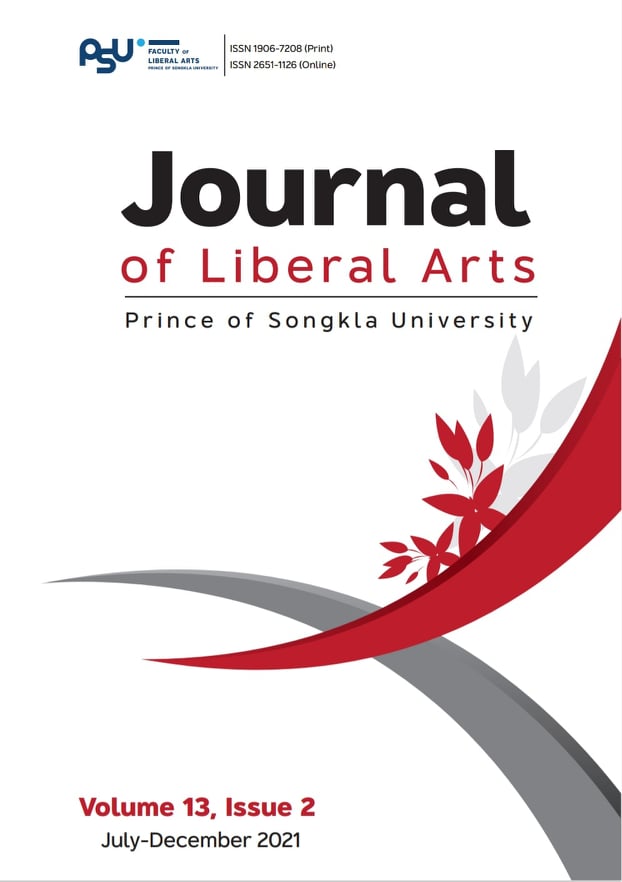Relationship between Personal Factors, Situational Factors and Mental Health Problems of Those Affected by the Unrest in Southern Border Provinces
DOI:
https://doi.org/10.14456/jlapsu.2021.11Keywords:
personal factors, situational factors, mentalhealth problems, those affected by the unrest in the southern border provincesAbstract
The objective of this research was to investigate the relationships between personal and situational factors and their ramifications on individual mental health problems of those affected by the unrest in the southern border provinces of Thailand. The study was quantitative, and the Psychological Impact Scale for Crisis Event–10 (PISCES -10) was used as a measuring scale. The 728 subjects were selected by a purposive sampling technique. Bivariate analysis was conducted by Chi-square analysis using R software. The major findings indicated that there are six factors which are statistically significant to the causal attribution of mental health problems of those affected by the unrest in the southern border provinces. These include gender, age, region, injury, death of a relative and being a relative of the injured. Gender and death of a relative of those affected by the unrest in the southern border provinces had a statistically significant relationship at the .001 level. Age and being a relative of the injured had a statistically significant relationship at the .05 level. Region and injury had a statistically significant relationship at the .01 level. The results revealed that the six variables relating to mental health problems were important, and affected the lives of people in the southern border provinces subjected to the civil unrest.
References
American Psychological Association. (2014). The Road to Resilience. UNCEW. https://studentsuccess.unc.edu/files/2015/08/The-Road-to-Resiliency.pdf
Chokdamrongsuknai, J., Kittitharaphan, W., & Bunsang, W. (Editor). (2015). Collection of academic articles at the 14th International Mental Health Symposium and the 12th International Mental Health and Psychiatry Symposium. Bureau of Mental Health Service Administration, Department of Mental Health. [in Thai]
Chongrak, D., & Parinyapol, P. (2019). Influence of resilience, coping strategies, and education on the mental health of paramilitary rangers serving in the southern border unrest. Hat Yai Academic Journal. 17(1), 33-47. [in Thai]
Goldberg, D. P. (1972). The detection of Psychiatric illness by questionnaire. Oxford University Press.
Grotberg, E. H. (1995). The International Resilience Project: Research and Application. (Reports-Research). Civitan International Research Center. https://files.eric.ed. gov/fulltext/ED423955.pdf
Jinpanyakul, J., & Puttisri, S. (2018). Factors affecting relationship to quality of life of high school students in the unrest situation in Narathiwat Province. Journal of the Psychiatric Association of Thailand, 63(1), 21-32. [in Thai]
Kaewnui, S. (2017, April 5). Events in the southern border provinces/Patani in 2016: the timing of the transition from “armed combat” to “peaceful means”. Deep South Watch. http://www.deepsouth watch.org/node/10037 [in Thai]
Office of the National Security Council, Office of the Prime Minister. (2017). Management and development policy of the southern border provinces 2017-2019. Printing House of Chulalongkorn University. [in Thai]
Poolsub, A. (2019). Modern warfare concept: violence and mental health situation of people in the southern border provinces. Songklanakarin Journal. 25(1), 159-181. [in Thai]
World Health Organization (2017). Mental Health Promotion, Concepts, Evidence, and Practice Guidelines (Summary Report). Wanida Printing. [in Thai]
Downloads
Published
How to Cite
Issue
Section
License
Copyright (c) 2021 Furqan Awaekachi, Sumet Promin, Kasetchai Laeheem

This work is licensed under a Creative Commons Attribution-NonCommercial-NoDerivatives 4.0 International License.
The authors retain the copyright to their article but the Journal of Liberal Arts, Prince of Songkla University reserves the exclusive rights to first publication.






